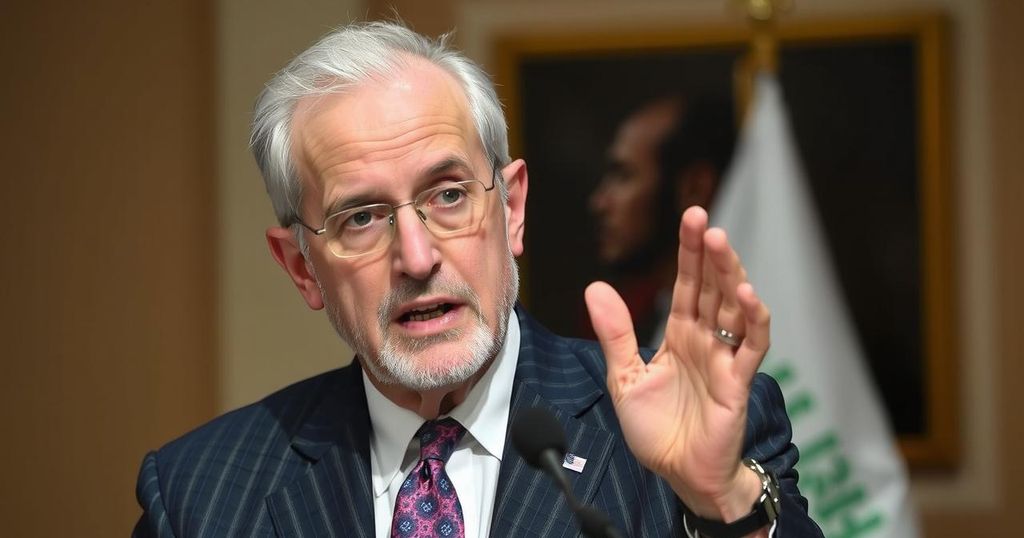Biden Calls Assad’s Fall a Win for Justice Amid Regional Risks

President Biden described the fall of Bashar Assad as a “fundamental act of justice” but noted the inherent risks it poses for the Middle East. The U.S. is monitoring Assad’s situation amidst military and political shifts in the region. Biden emphasized the need for a careful approach, especially regarding the humanitarian impact on civilians amid rising tensions.
On December 8, 2024, President Joe Biden characterized the fall of Syrian President Bashar Assad as a “fundamental act of justice” following decades of authoritarian rule. Speaking from the White House, he recognized the significance of this event but also cautioned that it heralded a period of “risk and uncertainty” for the Middle East. He noted that the United States was closely monitoring Assad’s possible flight to Moscow, while stressing that both Russia and Iran could no longer maintain support for Assad.
Biden credited U.S. collaboration with allies in diminishing the military and diplomatic backing of Assad, asserting that this shift has recalibrated the balance of power within the region. President-elect Donald Trump echoed Biden’s sentiments, stating that Assad’s retreat was a sign that Russian President Vladimir Putin had withdrawn support. Although Trump warned against U.S. military intervention in Syria, Biden’s national security adviser affirmed that no such military action was intended.
The rapidly evolving dynamics in Syria reflect broader regional tensions, exacerbated by Israel’s conflicts with Hamas and Hezbollah. Trump connected the incidents in Syria with the ongoing Russian invasion of Ukraine, suggesting that Assad’s weakened position may influence the overall geopolitical landscape, including prospects for peace in Ukraine.
While the Biden administration emphasized its commitment to combating ISIS in Syria, it maintains that its military presence is limited specifically to that goal. As the conflict continues to impact civilian life, calls for protection of minority communities and adherence to humanitarian norms have intensified. Amidst these developments, families of missing individuals, like journalist Austin Tice, continue to seek clarity and justice in a conflict that has persisted for over a decade.
The ongoing Syrian conflict has persisted since 2011, leading to widespread devastation and a complex humanitarian crisis. President Bashar Assad, who has ruled Syria since 2000, faced significant opposition during this period. The conflict drew in various international actors, creating a multifaceted political landscape. The U.S. has been involved in efforts to counter ISIS and support alternative governance structures in parts of Syria, while also grappling with the geopolitical maneuvers of countries like Russia and Iran in the region. The recent collapse of Assad’s regime marks a potential turning point in both Syrian politics and regional stability, eliciting responses and strategizing among global powers. The opposition’s ability to dethrone Assad raises questions about the future governance of Syria and the potential for further conflict, as various factions vie for power within a fractured nation. Biden’s acknowledgment of this situation emphasizes the delicate balance required in U.S. foreign policy, especially amidst rising concerns of escalating violence across the region. U.S. policy will need to navigate not just the immediate ramifications of Assad’s fall, but also the long-term implications for stability in the Middle East.
In conclusion, the recent developments surrounding Bashar Assad’s regime highlight a significant shift in the Syrian conflict, presenting both opportunities for justice and challenges related to regional stability. President Biden’s remarks underscore the nuanced interplay between condemning past oppression while recognizing the precariousness of the current situation. The Biden administration, along with President-elect Trump, expresses a cautious stance towards further military involvement, emphasizing the importance of protecting civilians and addressing humanitarian concerns as the situation evolves. The future of Syria remains uncertain, but the international community remains alert to the pressing need for an effective resolution.
Original Source: apnews.com






